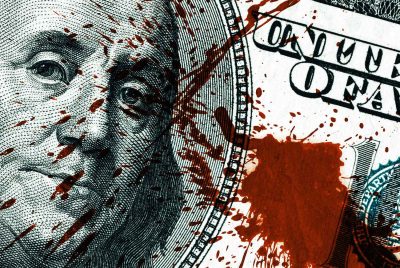×


We have detected your country as:
Please click here to go to the USA website or select another country from the dropdown list.
 According to Palestinian law, every Palestinian convicted of an attack against Israelis is eligible for lavish financial payments doled out in “monthly salaries” to both the terrorist and his or her family from the moment of arrest—with the bonus of additional cash grants and priority civil service job opportunities upon release. The deadlier and bloodier the crime, the higher the payload. The Palestinians call it the “Martyrs Fund.” Israel refers to it as “Pay-for-Slay.”
According to Palestinian law, every Palestinian convicted of an attack against Israelis is eligible for lavish financial payments doled out in “monthly salaries” to both the terrorist and his or her family from the moment of arrest—with the bonus of additional cash grants and priority civil service job opportunities upon release. The deadlier and bloodier the crime, the higher the payload. The Palestinians call it the “Martyrs Fund.” Israel refers to it as “Pay-for-Slay.”
Semantics aside, one would be hard pressed to interpret dangling a generous, long-term financial reward in front of potential “martyrs” and “heroes” as anything other than a powerful incentive to terror.
Former US President Donald Trump recognized the lunacy of the policy and repeatedly called on Palestinian Authority (PA) President Mahmoud Abbas to put a halt to it. The appeal fell on deaf ears. Abbas continued to funnel hundreds of millions of aid dollars to pay the 30,000 people on the “Pay-for-Slay” payroll. The US—the PA’s principal aid donor with more than US $5 billion contributed since the PA’s formation in 1994—put its foot down with the 2018 Taylor Force Act, effectively suspending US aid to the PA as long as it continues payments to terrorists and their families. The US–Palestinian relationship deteriorated quickly, reducing the association to stony silences and bitter accusations.
Israel followed suit with a “Pay-for-Slay” act of its own. Then the Dutch, Australia and the EU decided to cut funding too. Yet even with its cash coffers bare, the PA stuck to its guns, transferring at least US $159 million to terrorists and their families in 2020.
The inauguration of President Joe Biden may, however, usher in a new era for US–Palestinian relations—and a new lease on funding for the PA. While the PA steadfastly forges ahead with its “Pay-for-Slay” policy, Biden has restored US funding, allocating nearly US $100 million for Palestinian aid, thus removing the main financial deterrent standing in the PA’s “Pay-for-Slay” path.
Does the PA interpret this as a green light to incentivize terror against Israelis? Perhaps. As with everything in the volatile region, this too remains a watching and waiting game.
“President Trump raised his concerns about payments to Palestinian prisoners in Israeli jails who have committed terrorist acts, and to their families, and emphasized the need to resolve this issue.”
—A White House readout stipulates former President Trump’s stance on “Pay-for-Slay”
“I affirm to you that we are raising our youth…on a culture of peace. And we are endeavoring to bring about security, freedom and peace for our children…along with the Israeli children.”
—Abbas’s empty promise to former President Trump, vowing that the PA keeps its slate clean when it comes to incitement to terror
“You tricked me in DC! You talked there about your commitment to peace, but the Israelis showed me your involvement in incitement [against Israel].”
—Former President Trump upon catching Abbas in his bald-faced lie
“We urge you to raise this matter with President Abbas…and to make clear to him that the PA’s practice of diverting aid money to terrorists and their families must end. Morally it must end because the United States cannot be complicit in incentivizing terror, and strategically it must end because the PA will never convince Americans, the Congress or Israel that it is serious about peace while it is still funding terror.”
—Three senators call on former President Trump to push Abbas on the PA’s cash payments to terrorists
“The bill is not a result of animosity toward the Palestinian people. It is a pushback against state-sponsored terrorism. You will never achieve peace when you pay one of your young men to kill someone like Taylor Force.”
— Senator Lindsey Graham addresses the PA in his presentation of the Taylor Force bill
“The first test of peace is to say to them ‘Hey, you want peace? Prove it. Confront terrorism, stop rewarding terrorism, stop paying terrorists…’ I think the only chance that this will change is if there’s pressure brought to them to make this real change…That could make for a turning point.”
—Benjamin Netanyahu, Israeli prime minister
“We are all aware of the fiscal crisis the PA is facing and of the potential human, social and security consequences…At the same time, we do not support the system of Palestinian payments to ‘prisoners and martyrs.’”
—Johannes Hahn, EU commissioner for European Neighborhood Policy and Enlargement Negotiations
 “By Allah, even if we have only a penny left it will only be spent on the families of the martyrs and prisoners and only afterward will it be spent on the rest of the people.”
“By Allah, even if we have only a penny left it will only be spent on the families of the martyrs and prisoners and only afterward will it be spent on the rest of the people.”
—Abbas digs in his heels regarding “Pay-for-Slay”
“Even if only one shekel remains, we will give it to the families of martyrs.”
—Qadri Abu Bakr, commission of Prisoners and Released Prisoners’ Affairs, echoes his president’s sentiments regardless of the PA’s empty coffers
“The salaries of the families of the martyrs and the prisoners will be paid regardless of the cost…Non-payment of the public employees’ salaries…is less significant than subtracting one penny from the family of a martyr or prisoner…”
— Nabil Abu Rudeina, PA deputy prime minister, explains the decision to slash law-abiding civil servants’ salaries to avoid cutting payments to terrorists and their families
“The US is pleased to announce that we can resume economic, humanitarian and development assistance to the Palestinians.”
—Anthony Blinken, US secretary of state
“We continue to believe that American support for the Palestinian people, including financial support, is consistent with our values. It is consistent with our interests.”
—Ned Price, US State Department spokesman, comments on the resumption of US aid to the Palestinians
“In a nutshell…the PA has chosen terror over the well-being of its own civilian population. All it would take for it to avert the crisis is to do what should be expected of any political enterprise with a serious aspiration to build its own nation: renounce terror. Often, Israel is told that it must make sacrifices for peace. In this instance, the PA is making a sacrifice so that it doesn’t have to make peace. Understanding the PA’s decision makes clear on whom the onus falls for the failure to give peace a chance.”
—Josh Block in “To Its Detriment, the PA Spurns US Financial Assistance”
Photo Credit: Click on photo to see photo credit
All logos and trademarks in this site are property of their respective owner. All other materials are property of Bridges for Peace. Copyright © 2025.
Website Site Design by J-Town Internet Services Ltd. - Based in Jerusalem and Serving the World.